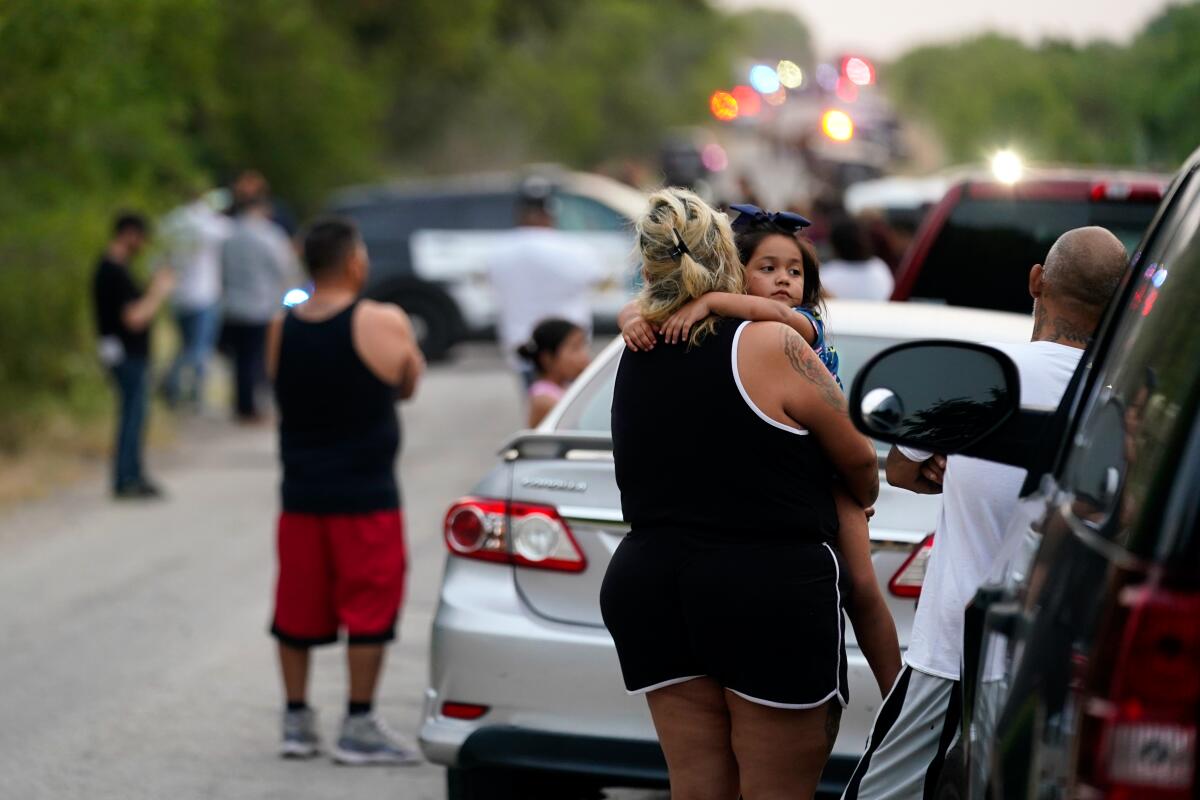Column: Unending deaths of migrants, driven by desperation and U.S. border policies

It’s one of the deadliest mass-casualty events connected to border militarization in years. The number of migrants found dead in a tractor-trailer in San Antonio Monday rose to more than 50 on Tuesday. Another 16 people, including four children, were transported to hospitals with heat-related illnesses.
Across Latin America, the terrified parents, children and siblings of people who recently crossed the border are desperately trying to learn whether their loved ones are among the dead. Calls have been pouring into search and rescue groups such as Aguilas del Desierto. This San Diego-based volunteer group was started by Ely Ortiz, a Mexican, whose brother died trying to enter the U.S. in 2009.
Opinion Columnist
Jean Guerrero
Jean Guerrero is the author, most recently, of “Hatemonger: Stephen Miller, Donald Trump and the White Nationalist Agenda.”
“They want to know whether we know their names or nationalities,” Octavio Soria, a Aguilas del Desierto volunteer, told me. Authorities hadn’t released that information when we spoke. “We’re telling them to call their consulates and watch the news. At any moment they could release the names.” Mexican Foreign Affairs Secretary Marcelo Ebrard later said on Twitter that the dead include 22 Mexican nationals, seven Guatemalan nationals and two Honduran nationals, among others.
When I spoke to Soria, he had just gotten off the phone with a woman in Guatemala. He had a hard time understanding her because she primarily spoke an Indigenous language. But she was crying and he gathered from her broken Spanish that she wanted information about her daughter, who had recently crossed the border with her 7-year-old child. She hadn’t heard from them since last Thursday.
Before the exact circumstances of the deaths were known, right-wing politicians were leaping on the tragedy to stoke the xenophobia behind the border militarization that has killed countless people entering the United States between ports of entry, where they’re systematically turned away. Texas Gov. Greg Abbott blamed the deaths on what he falsely characterized as President Biden’s “open border policies,” even though Trump’s most draconian border policies, “Remain in Mexico” and Title 42, a pandemic-related law used to expel migrants, are still in place.
Remittances are vital to many Latin American nations’ economies. A few policy shifts to increase the flow could do more good than another aid package.
In fact, Abbott has a central role in making the border more deadly. His beefed-up border militarization program, created with the governor of the Mexican state Nuevo León, Samuel Alejandro García Sepúlveda, has forced people to enter Texas in more dangerous ways — including by cramming into trailers.
Thousands of people have died trying to reach this country since the 1990s, when the U.S. began building a steel fence along the border that rerouted the flow of people from urban centers such as San Diego to remote deserts in Arizona and Texas, where they face death from dehydration, heat exhaustion and other risks. Later, the U.S. persuaded the Mexican and Central American governments to militarize their own borders, further endangering people en route to this country. Last year, 55 migrants trying to reach the U.S. died in a tractor-trailer crash near the Mexican-Guatemalan border.
Although Biden has attempted to distance himself from Trump’s border wall and largely stopped its construction, he has continued to invest heavily in border surveillance technologies and other enforcement measures with similar deadly consequences.
While most people in the U.S. never see these deadly consequences, volunteers like Soria witness them regularly. Aguilas del Desierto is made up of immigrants and others who work in construction, gardening and other fields. They spend their weekends searching for people who’ve gone missing along the border. Although the group sometimes saves lives, they more often bring closure to the families of the dead by locating their bodies.
Tens of thousands of people are killed in Mexico annually by American guns, which are flooding Mexico and unleashing terror across the country.
I hiked the border smuggling routes in Arizona with them several times before and during the Trump administration. Each time, we found human skulls and decomposing human bodies.
The border has become a mass grave and a testament to the decades-long inhumanity and irrationality of U.S. border and immigration policies. These routes are filled with Bibles, children’s photographs and other mementos brought along on the treacherous journey. Many of these items were lost as the desperate trekked through the desert or were scattered by animals who devoured the bodies.
As people try to find alternative routes into this country, what was once largely invisible to Americans is becoming more visible. Bodies are washing ashore in San Diego. Migrants are increasingly dying in collisions on U.S. highways.
I was a high school student when I read Luis Alberto Urrea’s 2004 book “The Devil’s Highway,” about 14 Mexican men who died trying to cross the militarized border in 2001. It’s unfathomable that people continue to die in this way — and that administration after administration has done nothing to change strategies. Most of the dead are people who were forced to cross illegally because they had no other choice. Legal routes were closed to them. A vast majority were fleeing for their lives — often displaced by U.S.-made guns.
There are non-deadly and far more effective alternatives to reducing migrant crossings, such as legalizing immigrants without documents in the U.S. so they can sustainably support their relatives back home and visit them in those countries without pressure to unite north of the border. Our politicians must consider those alternatives. In the meantime, people will continue to come to the U.S. and they will continue to die because they have no other choice.
More to Read
A cure for the common opinion
Get thought-provoking perspectives with our weekly newsletter.
You may occasionally receive promotional content from the Los Angeles Times.














